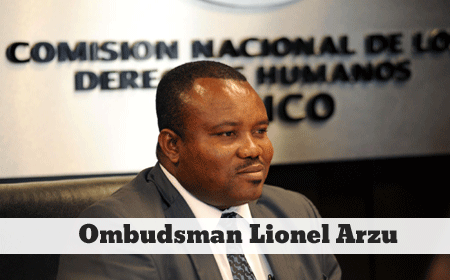BELIZE CITY, Wed. Mar. 15, 2017–The Belize Country Reports on Human Rights Practices recently released by US Secretary of State Rex W. Tillerson highlighted human rights abuses which continue to persist in Belize, most salient among them being the use of excessive force by security forces (especially the police), lengthy pretrial detention, and harassment and threats based on sexual orientation or gender identity.
The report said that, “Police abuse was the most common complaint, in particular against members of the Gang Suppression Unit.”
This week similar concerns were highlighted in the Sixteenth Annual Report of the Ombudsman of Belize for the period January 1, 2016 to December 31, 2019, which was released on Tuesday, March 14, 2017.
“Although the number and percentage of complaints against the [Belize Police Department – BPD] decreased in 2016, the Ombudsman’s office still received a number of complaints against their officers,” the report confirmed.
According to the report, the Ombudsman plays a supervisory role in helping to ensure the protection of the constitutional rights and freedoms of persons and the rule of law in Belize.
Roughly 4 in 10 complaints lodged at the Office of the Ombudsman (or 86 of 207) in 2016 were against the police and together with complaints about the prison, such complaints constituted just over half of the cases which were lodged at his office.
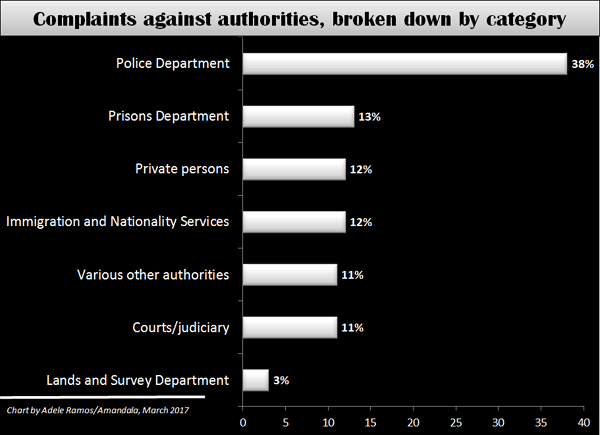
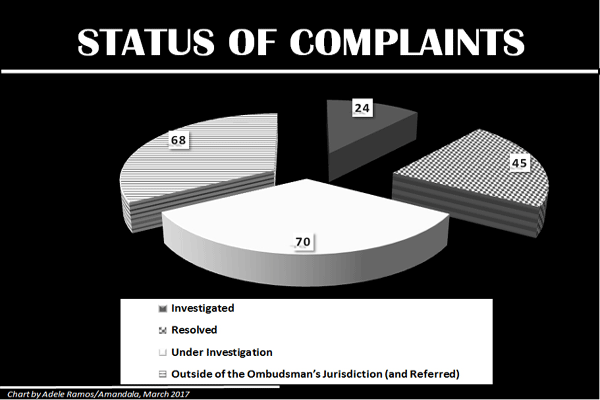
The recently released US report on Belize flagged impunity involving the security forces, including reports of police brutality and corruption, especially cases where cops extort people for bribes.
That report said that, “As of October the [Professional Standards Branch – PSB] received 64 formal complaints of alleged severe police misconduct. The PSB reported 41 officers were on interdiction or on suspension, of which 16 suspensions took place during the year.” By the end of 2016, there were 79 complaints, up almost 30% from 61 from the previous year.
The Ombudsman believes that cases concerning police misconduct should rightly be investigated by a more independent office.
“Make Professional Standards Branch more independent from the Belize Police Department,” the Ombudsman said.
“It is felt that private citizens make complaints to the Ombudsman more than the PSB because they mistrust the impartiality or fairness of the PSB when investigating colleagues,” he added.
“During the reporting period, the Ombudsman’s office received twenty one (21) new complaints of false imprisonment, harassment and, to a lesser extent, malicious prosecution,” the Ombudsman said.
He added that, “Many complainants felt that they were arrested and detained without reasonable cause. Quite a few complainants were released within the forty eight (48) hours constitutional period without charges; these are under investigation.”
He stressed that, “Persons’ constitutional rights to personal liberty and equal protection of the law should be respected at all times, regardless of criminal history.”
There were 12 complaints alleging the violation of constitutional protection from unreasonable search and seizure.
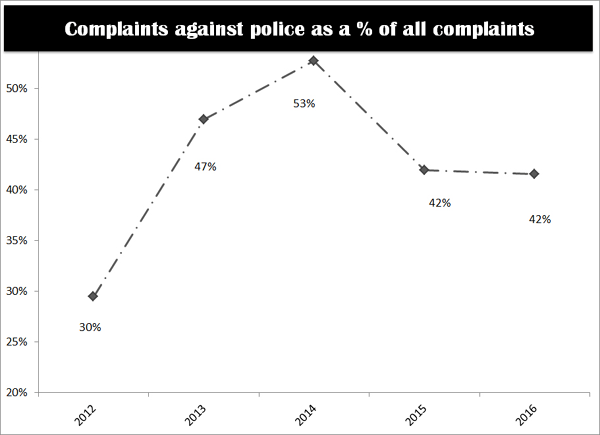
“Many alleged that officers of the BPD without a search warrant forcefully entered their premises looking for drugs, firearms and ammunitions, conducted searches and, in some cases, seized items. The Crime Control and Criminal Justice Act allows police officers to enter and search a special area of no more than one square mile without a warrant, for public safety or interest or for preventing or detecting crime.
“This area must have been publicly declared a special area by the Minister responsible for national security. The Ombudsman could not locate copies of public declarations of special areas during the reporting period. Power to search and seize without a warrant, other than in a declared special area, is very confined – to certain summary offences committed within his view or where an aggravated assault has been reliably reported as having been recently committed,” Arzu detailed.
Furthermore, there were 22 complaints of neglectful or biased investigations.
“Allegations include that police officers were not cordoning off the crime scenes and ‘combing’ the entire area collecting and preserving relevant evidence and clues; not taking statement from all relevant persons, including virtual complainants or, under caution, suspects; and, not investigating because of personal or other interest. One victim of domestic violence reported that the weapon used and her bloodied shirt were left at the crime scene, which resulted in the downgrading of criminal charges,” said the report.
The Ombudsman also highlighted the relative level of incarceration compared to the incidences of major crimes, and particularly property crimes such as robbery, burglary and theft.
“The 2016 statistics indicate that, except for rape, for which 75% of reports resulted in criminal charges, the more prevalent crimes from theft to murder have only a 12% to 46% prosecution rate, respectively. Furthermore, not all prosecutions result in conviction,” the Ombudsman said.
“Criminals have been acquitted because of a lack of evidence or impropriety during investigation,” he expressed.
There were also “…several complaints regarding inordinate delays with trials and hearing of appeals and the lack of legal representation or adequate legal representation for defendants. Most of these were from prisoners on remand.”
At the time of the report there were 474 prisoners on remand, 251 of them for murder; there were several persons listed on remand for years, and in three cases for more than 10 years.
“The delays with trials and hearings violate the fundamental human right to protection of the law articulated in Section 6(2) of the Belize Constitution, Chap. 4 Substantive Laws of Belize,” said the Ombudsman.
There were also 23 complaints during the reporting period about poor prison conditions.
“Many of the complainants were immigrants. The conditions complained of included: a diet that is inadequate in terms of nutrition and portion size; limited potable water, 1 to 2 gallons only per week per prisoner; salty bathing water causing rashes and allergies; filthy slop pail toilets; lack of hygiene kits; poor lighting; iron bed bases without mattresses or sheets; and overcrowding,” Arzu said.
He notes that according to United Nations rules, “…sanitary installations shall be adequate to enable every prisoner to comply with the needs of nature when necessary and in a clean and decent manner; slop pails are not clean and decent but are permitted by the Prison Rules; likewise, the water and diet. Prison conditions probably often do not reflect the principle of the dignity of the human person acknowledged in the preamble of the Belize Constitution, a foundational principle of Belize.”
As a result of these concerns, Arzu wrote authorities citing poor prison conditions and the need for raising the minimum standards and improving prison conditions, particularly sanitation, bedding, diet and overcrowding.
The Office of the Ombudsman, led by Arzu now for a third contract term, is tasked with investigating “complaints of corruption, wrongdoing, injustice, injury or abuse, including discourtesy, refusal to act and discriminatory acts, by a [public] authority or member or officer of an authority.”
Roughly a third of the complaints which reached his office were referred to another entity because of lack of jurisdiction to deal with those cases.
Almost 60% of the complainants were males and 77% were Belizeans. Roughly 7 in 10 complaints originated in the Belize District. Also among the complainants were 24 Salvadorans, 6 Canadians, 5 US nationals, and 5 Guatemalans.
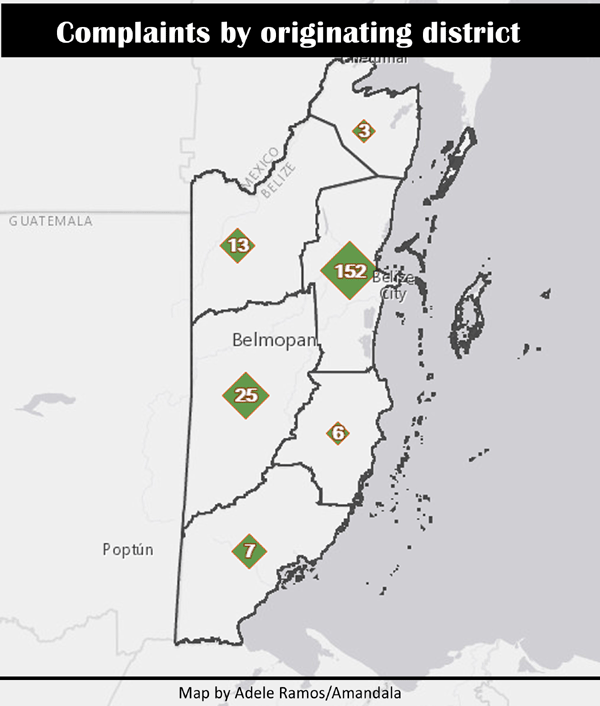
Of note is that Embassy of Guatemala in Belize lodged a complaint with the Ombudsman last year following the April 2016 shooting death of a Guatemalan minor in the Chiquibul, which triggered a move by Guatemala to deploy thousands of its troops to its border with Belize and the recall of its Ambassador to Belize.
The Guatemalans alleged that the BDF, who were on patrol with rangers of Friends for Conservation and Development (FCD), had used “unjustifiable and excessive force” in killing the minor. They also complained about an incident reported in the same area in May 2016.
However, the Ombudsman noted that, “With the approval of both the Governments of Belize and Guatemala, the Organization of American States (OAS) commissioned an independent team of experts from the United States of America and Mexico to investigate the fatality within the Belize Guatemala Adjacency Zone. Also, in May 2016, the Ombudsman of Belize and his legal Officer met with the Ombudsman of Guatemala, Hon. Jorge DeLeon, and his team at the OAS office in the Adjacency Zone to discuss the protection of human rights in the adjacency zone.”
The official report is filed with the National Assembly of Belize but it is also a public document available online.

